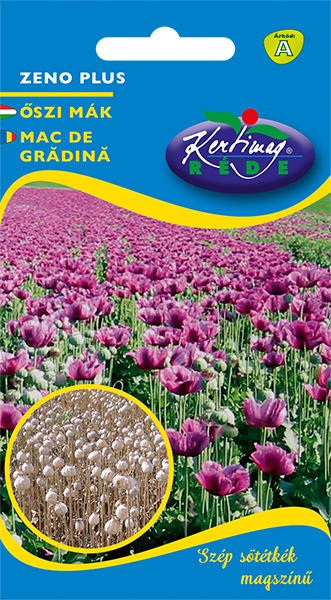Poppy autumn Zeno Plus 2,5 g
| HUF 369 * (nettó: HUF 291) | |
Introducing the Zéno poppy:
The Zéno autumn poppy is a frost-tolerant variety that can be sown in autumn and spring.
The autumn poppy is recommended for small gardens, as it is earlier growing, has a higher seed yield, is not susceptible to early frosts and is resistant to poppy seedling blight.
Choose a sunny, sheltered location for poppy cultivation. Only good soil with fine crumbly loose soil should be considered. Average, loose-textured soil is also suitable. Do not plant in the same place for more than 5-6 years!
The recommended row spacing is 30 cm. The autumn poppy will overwinter successfully if it develops a vigorous rosette of leaves. Initially, the poppy is water-hungry, but it needs dry, warm weather when flowering. From petal fall to full pod development, it needs warm, wet weather, while in the pod and seed maturation stage it again needs warm, dry, dry weather. At this time, wet weather is favourable for fungal infections.
Approximately 10 square metres, from which one and a half kg of poppies can be harvested.
Hatched rows of poppies should be harvested twice. First, leave a few plants in a bunch, 15-20 cm apart, and finally the strongest of these.
The hatched plants overwinter at the 4-6 ovary stage.
The poppy is one of the oldest cultivated plants, having been cultivated in Egypt as long as 4 000 years ago, and Hippocrates wrote about it as a medicinal plant and its narcotic properties.
It is also cultivated in significant areas in Europe, but its largest area of cultivation is in Asia Minor and Inner Asia. Its most important global benefit is the alkaloids it contains, especially morphine.
In our country, it is widely grown in arable fields and small gardens. It is a staple in traditional dishes such as festive bejgli and everyday poppy seed pasta, strudel, porridge and even ice cream.
We therefore grow varieties that are as low in alkaloids as possible and free of them.
However, an important product of poppy is the abundance of alkaloids extracted from poppy seeds, according to a world patent of János Kabay.25 types of alkaloids can be produced from poppy seeds, including narcotic, analgesic, sleeping pills and cough suppressants.
Its cultivation is therefore regulated by government and ministerial decrees. Low and medium active poppy varieties can be grown in small areas (less than 500 nm) without restriction for personal use.
Growing Zeno poppy:
Seed sowing:
Second half of September to second half of October. Very early sowing is a prerequisite for a good poppy crop. The seed is very small, 'poppy seed'. It can be grown all over the country, but prefers sandy loam soils rich in nutrients. Compacted, acidic, moist soil is not suitable for poppy production.
Sowing depth:
Poppy seeds should be sown shallowly, one to one and a half cm deep in the soil.
Sowing:
When the hatched plants have three to four leaves, the stand should be thinned so that the sprouts in the row are 5-6 cm apart.
Harvesting:
Can be harvested in June. The flowers, which open on stems 80-100 cm tall, develop into capsules. The necks of the poppy seed heads once had holes in them, through which the poppy seeds used to sprout. Zéno has a closed pod, so there is no need to worry about wilting.
Freshly harvested poppy seeds must be dehydrated, because the wet seeds will be filled in.
| Weight: | 0.005 kg |
|---|---|
| Width: | 140 mm |
| Height: | 80 mm |
| Length: | 1 mm |
| Aviability: | 1-4 nap |
| Basic sales unit: | db |
Login
Login
